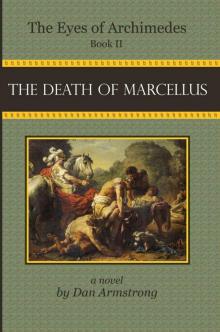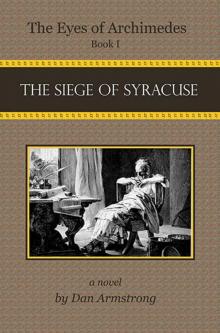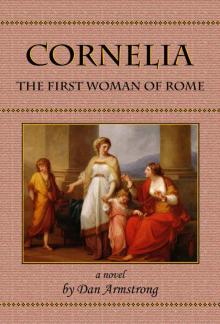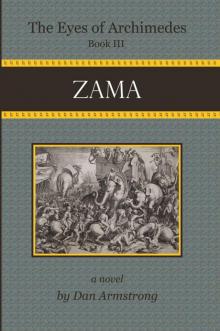Zama Read online
THE EYES
OF
ARCHIMEDES
BOOK THREE
Other Books by Dan Armstrong
Taming the Dragon
Prairie Fire
Puddle of Love
The Open Secret
Chain of Souls
The Eyes of Archimedes Book I
The Siege of Syracuse
The Eyes of Archimedes Book II
The Death of Marcellus
ZAMA
A Novel
Dan Armstrong
Mud City Press
Eugene, Oregon
The Eyes of Archimedes Book III
Zama
Copyright © 2016 by Dan Armstrong
All rights reserved. No part of this book may be used or reproduced by any means, graphic, electronic, or mechanical, including photocopying, recording, taping or by any information storage retrieval system without written permission of the publisher except in the case of brief quotations embodied in critical articles or reviews.
Published by
Mud City Press
http://www.mudcitypress.com
Eugene, Oregon
This is a work of fiction. Names, characters, places, and incidents are either the product of the author’s imagination or are used fictitiously.
The image on the cover of this book comes from an etching by Cornelis Huyberts after Cornelis Cort’s, Battle with the Elephants, 1701-12. From the collection of Nathan and Ana Flis, New Haven, Connecticut.
ISBN-978-0-9830045-7-8
Printed in the United States
To the End of War
AUTHOR’S NOTE
The Eyes of Archimedes is a fictional trilogy set during the Second Punic War, also known as the War with Hannibal. The Second Punic War began in 218 B.C. (the 291st year of the Roman Republic) and ended in 202 B.C. (the 307th year of the Roman Republic).
The many Latin, Greek, and other foreign names used for the characters in this novel are listed alphabetically at the back of the book for the reader’s convenience. A glossary containing words specific to the ancient world and/or Roman culture follows the list of characters.
Although I have made a concerted effort to be faithful to a very complex episode in ancient history, simplifications were made for the sake of readability. In the end, this is a novel. The narrator is fictitious, and his story an embellishment of the existing literature.
“Quite other instincts were loose. The red eyes of the ancestral ape had come back to the world. It was a time when reasonable men were bowled down or murdered; the true spirit of the age is shown in the eager examination for signs and portents in the still quivering livers of those human victims who were sacrificed in Rome during the panic before the battle of Telamon. The western world was indeed black with homicidal monomania. Two great peoples, both very necessary to the world’s development, fell foul of one another, and at last Rome succeeded in murdering Carthage.”
-H.G. Wells, The Outline of History
Western Mediterranean
The City of Carthage
The City of Syracuse
The City of Rome
PROLOGUE
I, Timon Leonidas, am now nearly seventy years old. I have spent most of my life as a mapmaker, but I have also managed to write three books recounting my experiences during the sixteen years of Rome’s second war with Carthage. In the first book, The Siege of Syracuse, I described how my father was killed by Carthaginian agents when I was thirteen, and that my mother and I were taken from our home in Croton and sold into slavery. My mother, Arathia, ended up in Rome. I was shipped to the city of Syracuse on the island of Sicily. Despite my father’s death and my kidnapping, I was fortunate even in tragedy. My master for three years was the Greek mathematician Archimedes of Syracuse, a kind man, as old then as I am now, who enabled me to greatly advance my knowledge of mathematics and geometry.
Syracuse was under siege by the Roman army during the last two years of my time with Archimedes. When the Carthaginian-controlled city finally fell, Archimedes was killed. Yet again, fortune was with me. The Roman general Marcus Claudius Marcellus took the time to question me about my master rather than turn me over to his soldiers as plunder. Marcellus immediately understood that I had learned quite a bit of science from Archimedes and gave me my freedom in exchange for tutoring his son and taking a position in the Roman army as a scribe.
In the second book, The Death of Marcellus, I described my first three years in Rome, my search for my mother, and three difficult military campaigns in the service of Marcellus during his fateful pursuit of the now mythic Carthaginian field marshal Hannibal Barca.
This third book covers the five years following my time with Marcellus. Two of those years were spent in Italy, prior to my going to Africa to accompany Publius Cornelius Scipio in his quest to defeat Hannibal and end the war.
I would never have thought to write these books if not for a gift I received from Archimedes. More than a mathematician, Archimedes was a remarkable inventor and engineer. His war machines were all that kept the Roman army at bay during the early months of the siege. The day Archimedes died, he gave me two lenses, one a clear crystal disk the size of my palm, the other a bead of glass the size and shape of a lentil. The lenses were a product of his work in optics, something I had been intimately involved in. When used together, the lenses vastly improved one’s eyesight. The cuts and grooves in the bark of a tree became visible from a hundred feet away. The moon seemed to drop out of the sky to within arm’s reach. As intimidating as Archimedes’ weapons were, the power suggested by the two lenses was arguably greater, speaking to a higher more arcane use of science. Archimedes understood this, and in his final days did not believe humankind was ready for either his weapons or the lenses. When he gave them to me, it was with a promise not to reveal them to anyone unless my life depended on it.
During my three years with Marcellus, I kept the lenses secret even though they would have had military value to this man I greatly respected and to whom I owed my freedom. Like a miser with the key to a strongbox filled with treasure, I refused to use that key when many I knew were needy.
Marcellus met his death in an ambush. I was there. Afterward I understood that I could have prevented the ambush and saved a great man’s life if I had used the lenses. But I didn’t. In fact, I had become so accustomed to keeping the lenses secret, it never entered my mind—until after the tragedy, and then with deep anguish and guilt, as though I were personally responsible for Marcellus’ death.
The happenstance of Marcellus’ death and my error of omission convinced me to break my promise to Archimedes. It was not a sudden decision. I stewed over it many months after the ambush. The entire time the two lenses hung in a leather pouch on a cord around my neck like a millstone, heavy with the weight of some terrible responsibility that I could no longer bear.
This third book is as much about the lead up to the battle of Zama that ended the war as it is about the difficulty of revealing a remarkable and powerful secret. I didn’t rush out and tell everyone I knew so that I could achieve sudden fame or influence. No, this is a story about revealing something that to most would appear to be magic or some kind of trick. It had to be done with care and discretion. The taboo, my promise to Archimedes, had, in my mind, been lifted. I would open that strongbox, but I would only use the treasure in instances of absolute necessity or clear purpose.
PART I
MESSAGE FROM CROTON
“Vision, in my view, is the cause of the greatest benefit to us, inasmuch as none of the accounts now given concerning the universe would ever have been given if men had not seen the stars or the sun or the heavens. But as it is, the vision of day and night and of months and circling years has created the art of numbers and has given us not only th
e notion of time but also means of research into the nature of the universe.”
-Plato
CHAPTER 1
I had never seen the streets of Rome so quiet. Even the Roman forum seemed subdued as I headed east across the city from the Altar of Concord to the Temple of Vesta in a light rain. Rome’s war with Carthage was entering its eleventh year with no end in sight. Both consuls for the year, Marcus Claudius Marcellus and Titus Quinctius Crispinus, had been killed during the summer. Never before had two consuls died in a single season of combat. The populace read this as the worst kind of omen. Rumors in the street of Hannibal’s brother’s imminent arrival in Italy were as prevalent as widows of the war. Not since the Carthaginian victory at Cannae had the level of fear in the Roman people been so great.
After three years in Rome, I called it my home. I was twenty-one and stayed on a farm west of the city, owned by my friend Marcus Claudius, the son of the recently deceased consul. I had taken to wearing a toga, and now that it was winter, also with an unbleached wool himation draped over my shoulders.
I had returned to Rome in October from what had been Marcellus’ last military campaign. Three anxious months had passed since then, as I waited for word from my mother, who had promised to contact me in the fall. Our last communication had been in July when I had learned she was traveling with Hannibal’s army as a singer, to entertain the great general himself and act as a Roman spy. My only break from worrying about my mother and the somber mood in the Claudian household following Marcellus’ tragic death, was the tutoring I did once a week. That was my destination on this day. I was going to a home on the east side of the Palatine Hill to teach geometry to the daughter of a wealthy Roman aristocrat.
Teaching fifteen-year-old Sempronia geometry was both a delight and something short of torture. I had met her two years earlier and had fallen for her immediately. By the third tutoring session, it was clear she had also taken a liking to me. Our class difference—her being the daughter of a patrician, me being a landless Greek only three years out of slavery—meant our relationship could never be more than teacher and student. It was something we both understood but never openly discussed, mostly because we were always chaperoned when we were together.
Sempronia’s home was as luxurious as any in Rome. I knocked on the door and was greeted by the housemaid Dora. I could smell the fragrance of juniper burning in the braziers the moment I entered. I followed Dora into the atrium, where decoratively painted, two-story columns circuited a large, tile-lined pool containing water lilies and carp. Wall hangings from Corinth and Cyrene adorned the walls, along with some twenty wax masks—imagines—cast from past members of the Sempronian clan. Sempronia sat on a stone bench out of the rain beside a brazier. Although she didn’t smile, her eyes lit up upon seeing me, and I did my best to similarly contain my reaction to seeing her.
“Timon!” squawked Ajax from the corner of the atrium, followed by the parrot’s piercing array of whistles and chirps.
Dora, who would stay with us throughout the lesson, quickly covered the bird cage, then busied herself sweeping. I sat down beside Sempronia with my wax pad, a compass, a straightedge, and a bronze stylus. By some unstated agreement, we both tried to downplay how much we enjoyed our time together. Sempronia was a fabulous student, and if we had no other life together, the abstract world of plane geometry was our platonic sanctuary.
“What are our lessons about today?” Sempronia asked, glancing into my eyes briefly, before looking down at her lap.
“We’ll use a compass to bisect an angle,” I said. “It’s one of the most basic and useful geometric constructions there is.”
Sempronia watched as I demonstrated. I used the bronze stylus and the straightedge to etch two intersecting lines on the surface of my wax pad. I labeled the point of intersection with the letter “A.” I set the compass to an arbitrary width and swung an arc from point A that crossed both legs of the angle created by the two lines. I labeled the points of intersection “B” and “C.” I then swung an arc from each of those two points so that they intersected in the area between the two legs. I labeled that point “D.”
“If I use the straightedge to connect point A to point D,” I said, “the line AD will bisect the angle BAC. Can you see that?”
Sempronia nodded. “Angle BAD equals angle CAD.”
“Exactly.” I smoothed the surface of the wax. “Now you do it.”
As I handed her the pad and the tools, my hand touched hers. Our eyes met and held, as though we were sharing the most daring of intimacies. Sempronia blushed, lowered her eyes, then without any hesitation executed the simple construction. “That was easy,” she said. “What’s next?”
“Proving why that works. It’s likely to take us the rest of the lesson.”
During the process of going through the proof, we exchanged the wax pad several times, talking only about the geometry, but also writing short personal comments in the wax and allowing our hands to touch, however slightly, each time we passed the pad back and forth. Dora, across the garden, appeared to be deep into her cleaning and didn’t seem to notice.
I etched How are you? in the wax.
The question brought a sadness to Sempronia’s blue eyes and she wrote, My mother spends too much of her time trying to find me a husband.
Is that so bad? I wrote back, thinking just the opposite.
It’s awful. No one will have me. Word has gotten out that I was rejected as a Vestal Virgin.
Sempronia had been selected to be one of the six Vestal Virgins a year earlier. Although this was a highly regarded honor, the pontifex maximus had chosen her as a way to deliberately block Sempronia’s marriage to his political adversary’s son Marcus Claudius. It was nothing more than spite. In the end, neither the marriage nor the induction to the Vestals occurred, but the rumor passed among the upper class that Sempronia was damaged goods—though she was, in fact, a virgin.
I knew the story too well, and when tears began to form in her eyes, I couldn’t help myself. I leaned over and whispered, “I would marry you.”
Though we both knew that was impossible, Sempronia allowed a slight smile, then kissed me lightly on the cheek, something that had never happened before.
Before my heart could leap out of my chest, Dora tromped across the atrium to where we were sitting. “What’s going on here?” she demanded.
“Nothing, Dora. We’re working on a proof,” replied Sempronia.
Dora snatched the pad from my hand and saw what Sempronia had written. “The lesson is over,” snapped Dora. “Sempronia, I will talk to your mother about this later.” She glared at me. “Timon, you must leave.”
Despite Sempronia’s protests, Dora, who had clearly seen the kiss, escorted me through the house and out the front door, slamming it behind me for emphasis.
CHAPTER 2
I spent the next week helping Marcus with work at the farm. I went into Rome at the appointed time for the next tutoring session, not really certain what to expect. When Dora opened the door, she acted like she didn’t know me.
“What are you here for?”
“I’ve come to give Sempronia her geometry lesson.”
“There will be no more lessons. Her mother has canceled the tutoring.” She started to slam the door, but I caught it with my hand.
“Can I talk to Sempronia? What does she think about this?”
“What Sempronia thinks means nothing. It’s her mother’s decision. There will be no more tutoring. Now please leave.”
I didn’t remove my hand from the door. Dora glared at me. I wanted to storm past her into the house, but instead backed away from the door stunned. Head down, a knot in my stomach, I walked across the city to get my horse. Since Marcellus’ death a rift had grown between Marcus and his mother Portia. Marcus tended to stay at the villa on the farm, and Portia stayed at the Claudian residence in the city. When I came into Rome, that was where I stabled Balius.
I passed through the forum, oblivious to
the speakers, then headed south past the Circus Maximus along the base of the Aventine Hill. Just before I reached the Claudian residence, I felt a hand on my shoulder.
I abruptly turned around hoping that Sempronia had escaped from her home and come running after me. Instead I saw the smirking face of Quintus Ennius, the skinny and often drunk poet, who always pestered me for a spare coin.
“Timon, I can’t believe I found you so easily.”
I was in no mood for Ennius or his silliness. “My means of employment has ended, Quintus. I have no money. Please leave me alone.”
“Caelius wants a word with you.” He looked over his shoulder, suddenly growing serious. “Come to the Community of Miracles tonight. It will be worth your while.”
“I live out of town, Quintus. I can’t make it.” I turned away from him and continued on my way.
He hurried after me. “There’s a message for you,” he said as he drew up alongside of me, skipping sideways to keep up and smelling of stale wine. “Something I think you might like to know.”
“Like what?”
Ennius always did this, taunting me with little secrets he might know, all leading to his needing a quadrans to buy a drink. Again he looked around as though someone might be watching. “I can’t say. Just be there.”

 The Death of Marcellus
The Death of Marcellus The Siege of Syracuse
The Siege of Syracuse Cornelia- the First Woman of Rome
Cornelia- the First Woman of Rome Zama
Zama